Controlling NATO: The Real Agenda At Prague
By Selwyn Manning – Scoop Co-Editor
Between November 21-23 NATO member countries will descend on the Czech Republic’s capital city Prague. There, heads of state, presidents and prime ministers will discuss issues such as the “NATO response force proposal” – a policy central to the United State’s “National Security Strategy”. NATO plans to draw into its fold Eastern European states vying for entry to the European Union. It is a consolidation of a New European Pact, a forging of a new military and economic order.
During the Cold War years the USA dominated NATO strategy. Post Cold-War NATO shaped into a more isolated friend of US foreign policy. But the Bush Administration is positioning to again dominate NATO. A necessity largely due to Germany, France, Russia respectively refusing to become lapdogs to Bush diplomacy as British Prime Minister Tony Blair has become. For Bush, NATO is the vehicle that will accommodate a military coalition that will “Partner” the USA in its imminent war against Iraq, Libya and a host of other “Axis” countries.
European diplomacy has clearly often been the nucleus of destruction. Is it now the only buffer left between peace-comparative and Manifest Destiny – the dream of Fortress USA to express its institutions around the world?
The USA’s new foreign policy strategy embraces what diplomats call “pre-emptive defence” – ie; striking opponents before they can strike you. But will European leaders risk subscribing to the USA’s global dominance framework? See also: Imperial PAX Americana
This question is what marks the Prague summit. The short to medium term future of millions of people will ride on the outcome. Should European rhetoric be laced with appeasement, accommodating the Bush Administration’s grand-plan, innocent people, worldwide, will choke from ashes in their mouths.
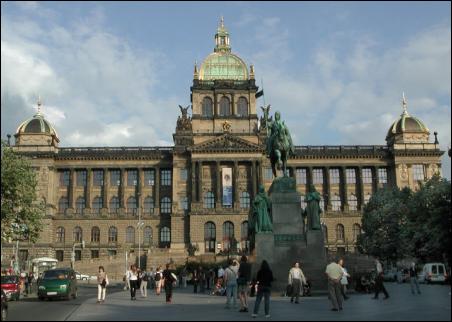
“As I walk through the Vaclav's square, up to the National Museum, I see Radio Free Europe on the left, and few armoured cars, with solders, armed to the teeth. It is really strange. People here say this is how it was when we were occupied by Russians,” Scoop’s contact says. Photo courtesy of the Prague Information Service.
Officially the Prague Summit is all about NATO gathering European states into the North Atlantic Treaty Organization incognito with the EU’s push to consolidate and become one. The European Union has been paving the way to allow entry for relatively new former eastern block economies into the Union.
But the EU's another story. Clearly NATO’s push is more to do with the United States massing an army of awesome proportions. The purpose: to counter a perceived Islamic-Arab Global threat, and to rustle up the means to enforce western alliance control of Eurasian oil and mineral wealth, and to advance United States military dominion over more than half the globe’s surface.
The United States has long coveted control over the former Soviet republics of Central Asia. As Gore Vidal wrote recently: Turkmenistan, Uzbekistan, Tajikstan and Kyrgyzstan are all 'of importance from the standpoint of security and historical ambitions to at least three of their most immediate and most powerful neighbours - Russia, Turkey and Iran”. For more see… The Enemy Within .
This is just one factor in a mass of complex diplomatic considerations and networks that will be partially tied down in Prague.
NATO is transforming from a counter-balance to post WWII Warsaw Pact ideology, to a military wing progressor of capitalist-western globalisation. Intelligence reports from European states reveal a co-ordinated positioning of economic sectors, European states, detailing perceived threats to reforms driving economic and social progress.
Intelligence agencies are being co-ordinated from the hub of an integrated alliance – centrally organised by the CIA. Feeding into the intelligence mix are the old practitioners: including the MI5, KGB, Mossad, Direction de la Surveillance du Territoire [French DST].
This western intelligence alliance is seen active daily, in foreign affairs reports, warnings to citizens to defer travelling to various parts of the world. Secret reports to intelligence services of friendly nations on operatives and individuals who may be residing within their regions. The USA is central to the distribution of the information. This was seen post-the Bali bombing and the subsequent fallout of who was told what, when and if.
Backed by this mix of intel, NATO would play the dominating role in global enforcement.
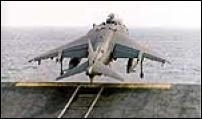
The NATO member countries are: Belgium, Canada, Czech Republic, Denmark, France, Germany, Greece, Hungary, Iceland, Italy, Luxembourg, The Netherlands, Norway, Poland, Spain, Turkey, United Kingdom, The united States of America.
Candidate nations are: Albania, Bulgaria, Croatia, Estonia, Latvia, Lithuania, Macedonia, Romania, Slovakia, Slovenia.
So does NATO conjure up security and reassurance for Europe? Recent operations have their critics: European writer Alexander Zaitchik eloquently writes: NATO means North Atlantic Treaty Organization, the body that has kept a fairly low profile since bombing Serbia in 1999: “That was a long hot NATO summer, featuring very angry Russian prime ministers (Primakov was en route to Washington for talks when the bombing started), downed U.S. B-2 Stealth bombers (for which the Serbs used the Czech-made Tamara radar), and a daring "accidental" U.S. direct hit on the Chinese embassy in Belgrade (the CIA swore there was a spaghetti stain on the map). You might also remember NATO from the absurd U.S.-Russian race for the Pristina airport after the Kosovo cease-fire. An overzealous U.S. General named Wesley Clark wanted to take back the airbase by force after Russian peacekeepers beat his troops to it by an hour. His plans were thwarted only when the gruff British commander Sir Mike "Vader" Jackson pulled rank and ordered Clark to back off. Thus did Jackson prevent a U.S.-Russian fire-fight and emerge as the sole hero in NATO's war with Serbia.”
For others, NATO was the balancing factor in a Europe threatened by Soviet totalitarianism. NATO needs to transform to become effective once again.
A NATO statement summarises: “The establishment of the NATO-Russia Council at the Rome Summit on 28 May 2002 opened a new chapter in NATO-Russia relations. The Council brings together the 19 NATO Allies and Russia to identify and pursue opportunities for joint action at 20 as equal partners. Diplomats see this as real progress toward a united and peaceful Europe.”
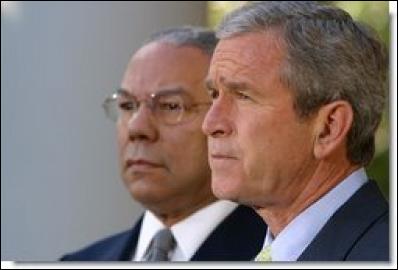
US President George W Bush and Secretary of State Colin Powell have successfully brokered power within the United Nations security council. They now need NATO firmly within the their fold. [Image courtesy of The White House].
Officially - at the Prague Summit, Heads of States and Government of the 19 NATO member countries and 27 partner countries will discuss key issues affecting Euro-Atlantic security and stability.
New Threats - NATO Heads of State and Government plan to adopt further measures aimed at strengthening the Alliance's capabilities for fighting terrorism.
Enlargement - NATO will continue its process of enlargement by inviting one or more aspirant countries to join the Alliance.
New Capabilities - Proposed measures to increase the Alliance's operational capabilities will be submitted for approval by the Heads of State and Government.
New Relationships - NATO will look at strengthening its partnerships with non-NATO countries.
Balkans - Heads of State and Government will reiterate the Alliance’s commitment to security and stability in the Balkans.
But is NATO destined to be the USA’s Autobahn-mobile that will transport assigning nations to the Middle Eastern Front?
Case in point: In October, NATO Secretary General Lord Robertson met George W Bush at the White House, seeking clarification of what the USA wanted from NATO at November’s summit. After the meeting Bush told reporters: “We are mainly discussing issues that we will confront and/or deal with in Prague, including NATO expansion. He's soliciting the views of the administration. I told him that we would give him a definite answer about our views on expansion in a couple of weeks, and that timetable seemed satisfactory with him.”
Lord Robertson responded happily: “We're now a month to the day away from the Prague Summit, probably the most important summit meeting in NATO's history, a transformation summit where NATO has to transform itself to deal with the threats and the challenges of the 21st century. And I believe we will have a good package on new members, a robust enlargement, new capabilities to deal with terrorism and to deal with the other challenges and nightmares that we may face ahead in the future, and new relationships with Russia, with Ukraine, with our partner countries, building the world's largest permanent alliance and one on which the world can rely on.”
For more listen to… http://www.whitehouse.gov/news/releases/2002/10/20021021-8.a.ram
Inside the Czech Republic people are tiring. Again, they are about to yield to security repression not experienced since pre- Velvet Revolution times. Why? Because NATO is coming to town.
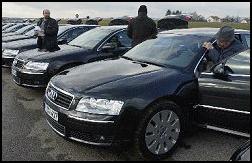
The protection service of the Police of the Czech Republic took over on Sunday, November 10, a total of 55 Audi A8 limousines to carry the heads of state and government who will take part in the NATO summit in Prague. The cars were taken over at Horovice airport. The eight-cylinder engine, four-wheel drive and six-speed gearbox cars are in three colours: black, silver and "polar light" blue. Image courtesy of the Prague NATO Official Information Service.
The Czech Republic’s capital city, Prague, is buzzing. Not with a bustling local economy, although Prague is definitely on the move, no this bustle is a well-spun crackdown, the beginnings of a city-wide tank-enforced lockdown, military snipers posted on its rooftops, spooks watching, noting whose who, who said what, whose with who, when, where, detailing how but failing to consider why.
Scoop contacts inside Prague say some locals couldn’t care less. One contact says: “People wonder what all this fuss is about? NATO, what’s that? Many people here in Prague will stay home, lie on the sofa, watch TV with a bottle of Pilsen.”
Others have had enough. They are heading out of town for the duration of the Prague NATO summit meetings. Their government has encouraged this mass exodus, why even the Czech Republic’s Minister of the Interior, the Minister of Security and the Czech Premiere, our Scoop contact says will be ‘outa town when Bush and the NATO boys ride on in’.
But European secret service operatives are not so blasé. Prague’s people-vacuum will soon fill with others, and they are massing in thousands.
Already Scoop’s contacts report armed guards surrounding ‘key locations’ in and around the old-city. Radio Free Europe has machine-gun toting centuries armed and ready for strife.
“As I walk through the Vaclav's square, up to the National Museum, I see Radio Free Europe on the left, and few armoured cars, with solders, armed to the teeth. It is really strange. People here say this is how it was when we were occupied by Russians,” Scoop’s contact says.
Yes the men-in-black are back, watching, noting. The Army and security forces have been training in the forests and nether-regions of the Czech Republic: “The training is extremely rigorous, there have been casualties already due to the live nature of the training,” Scoop’s contact says.
The Czech secret service is relishing the operation.
The Czech Republic’s Ministry of the Interior document titled: “Report On The Issue Of Extremism In The Czech Republic” details groups that could pose a threat to NATO officials and heads of states of member countries.
In a country that just over a decade ago was repressed under the Iron Curtain, all this security spook hype is reminiscent of a long, haunting nightmare, and Scoop’s contact says the timing is all wrong: “Prague is still reeling from the summer-floods, a disaster that has left many of Prague’s old quarter streets as ‘no-go-areas’.” She says locals laugh as flags and signs prohibiting citizens from venturing into old streets that are under repair will no doubt be used in protests as shields against street violence.
But Interior Minister Stanislav Gross has vowed to resign if this NATO meeting fails to be a security success. He’s serious, there’s pride at stake. And the Spooks? Yes they are busy washing windows by day and noting from the shadows at night.
A Co-ordinated network of anti-capitalist cyber-terrorists? Or a vehicle for the expression of discontent among the world’s thinking people?
This report titled “The Issue Of Extremism In The Czech Republic” cites groups to be isolated, prevented from entering the Czech Republic. These groups include those affiliating to independent media organizations, yes like www.scoop.co.nz, an independent news agency operating from New Zealand, but particularly the global network of indymedia news sites, see: www.indymedia.org, groups opposed to the spread of economic globalisation, and others promoting peace and justice that publish messages via independent media outlets.
The report states: “Street protests are a public manifestation of concealed, but currently running activities whose final aim is not to abolish or to change the attitudes of the actual institution but to block the current economic system of the democratic world, i.e., using the words of adversaries, ”to destroy capitalism”. Public protest activities are then presented as a legitimate ”defence against joint terrorism of the state and globalisation”.
Anti-globalisation activities it says are organised by: “a world-wide coordinated network formed by various radical, mostly extreme, left-wing groups in individual countries.”
The attention has increased as Indymedia’s growth-curve has climbed. Indymedia’s branch sites have popped up all over the world. It has become a hub for co-ordinating alternative reports of global issues and presenting a voice for millions of ‘global’ citizens who feel disenfranchised from the status quo, from mainstream media, particularly on issues opposing globalisation, and the ‘Americanisation’ of cultures, economies and governments around the world.
Indymedia’s open publishing policy has therefore drawn attention from spooks and security officials. The Czech Interior Ministry report states: “Independent Media Centre (IMC) was set up during the demonstrations in Seattle in November 1999 as an "independent and democratic group of journalists and politically conscious individuals from all the world ". This group is made up of about 50 persons. During actions, it is extended by volunteer street "co-workers" who are responsible for collecting data. The IMC is well organised and therefore it is highly operable.”
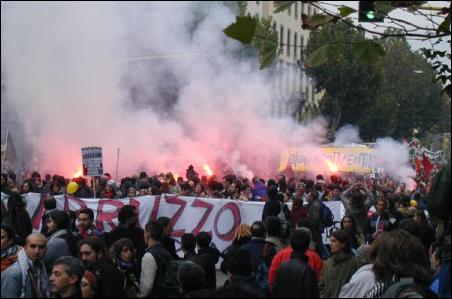
The international protest movement has grown, as can be seen from this image [courtesy of Indymedia] taken during protests in Florence this month.
Indymedia, the spooks say, is under the wing of People’s Global Action (PGA).
“People’s Global Action (PGA) is an international anarcho-autonomous, anti-capitalistic and anti-globalisation movement established in 1998 which, however, remains in background. It has become a principal source of anti-globalisation activities. It has neither any organisation nor a central office. It has only the coordination of the Convenors Committee. This committee consists of 12 activists from states determined in advance; the activists from the Czech Republic are not represented. The PGA enforces ‘confrontational attitudes’...”
It is clearly a response to Indymedia’s German site where the open co-ordination of anti-globalisation and anti-war protesters communicate. They are massing in their thousands from within Germany and in the Czech border nations of Austria, Italy and Poland. Some say the groups are currently preoccupied with examining ways to avoid getting plunger-raped by the cops. On the other side, Czech security is preparing to virtually close the borders in an attempt to keep foreign protesters out.
The protests have grown in recent months due to the USA’s hawkish stance against Iraq and the issue of its National Security Strategy document. The protests are now an expression against globalisation, but not just in the economic sense, the movement is opposition to the creeping advent of Americana, and the slow but sure relinquishment of sovereign state self-determination, particularly with regard to foreign affairs policy.
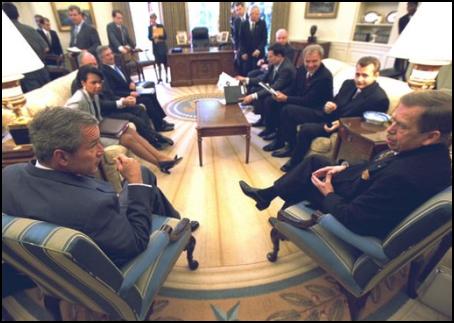
Czech President Vaclav
Havel met with US President George W Bush in the White House
in September. [Image courtesy of the White
House].
Just prior to November 21, leaders of western alliance states will land on airfields inside the Czech Republic. Under heavy security they will make their way to Prague for the NATO heads of state summit meeting.
Will mayhem break out? Of course.
Czech security expects street violence to exceed levels fought during Prague’s International Monetary Fund meetings when thousands of Italian protesters flooded into Prague. Many were locked up, until Italian and Czech diplomats brokered a release.
Street clashes and overly violent security responses in Genoa Italy and in Seattle USA have hardened protest actions. But the obvious threat of violence is no deterrent. Recent protests in Florence against the USA’s threat of war against Iraq drew up to 1 million people in a massive outpouring of people’s street action.
The Czech Interior Minister Stanislav Gross is bracing against this tide. Gross has detailed the “primacy of security” over individual rights in a "post-9/11 world." So much so, that Czech President Vaclav Havel called him to calm down. From his sick-bed Havel said; is it any wonder the people of Prague are wary, the weight of military security has crushed them before. He issued a lighten-up message to his administration.
Havel connects with many Czechs, is seen as a brave man who as a writer challenged the Soviet led government of Czechoslovakia at a time when to do so meant imprisonment or your life. But his ties with the USA have engendered concern among some. On Sept. 18, 2002 US President George W. Bush welcomed Czech Republic President Vaclav Havel to the White House. "Mr. President,” Bush said “you are a unique person who has helped change the world. I am proud to call you friend, and my nation is proud to call the Czech Republic friend, as well.”
Havel replied: “I would like, publicly, to thank you for your solidarity and your support during terrible floods which were in my country. I would like to assure you that the Czech Republic is and will remain good friend of the United States, good ally. I hope that the next step will be done in the summit of NATO, which will be in Prague, which is for us a big honor. I think that now it will be important if NATO will able to identify itself, to find its new identity in this very changed world. And especially now, after 11th of September, I think there is a lot of new kind of evil in this world, and it is necessary to face this evil and to face all who support it.” For more listen to… http://www.whitehouse.gov/news/releases/2002/09/20020918-3.a.ram
Havel is an ailing man, chronically ill after operations for lung cancer almost took his life. He now spends much of his time in warmer climbs on the Mediterranean coast of Spain. The Czech people now his term of office is drawing to a close and wonder, who remains to take over the presidency. Scoop’s contacts in Prague favour Deputy Prime Minister and Minister of Interior Stanislav GROSS to take over from Havel. But the 33 year old’s ambition could be chilled if this NATO meeting is a security flop.
Despite Havel’s call to his security forces for calm and restraint, once November 21 rolls on in, so will the tanks. Polls show many will head for the hills. Czech-based writer Alexander Zaitchik of Freezerbox.com says tourists are abandoning Prague as an itinerary destination; after all, he says, “what’s the point visiting a lovely ancient city if you're hounded day and night by a guerrilla opposition army and you can't leave your hotel because the tear gas and concussion bombs give you red-eye.”
Indymedia-Germany reports suggest totalitarianism is assumed and that it respects no ideology.
NATO is currently encouraging expansion of candidate countries, soliciting membership and providing a framework of structural reform economically and militarily. However, NATO still struggles when asked: “membership towards what?”
US President Bush will meet Russian President Vladimir Putin immediately after the November 21-22 summit. Bush is expected to travel to Russia en-route to the United States.
Bush wants Putin back inline after distances became evident over Washington's push for United Nations authorization to attack Iraq if Baghdad did not cooperate with weapons inspections.
Bush and Putin were to meet unofficially while at APEC in Los Cabos, Mexico, but the talks were scrapped after Putin stayed in Russia to deal with the Moscow Theatre hostage crisis, and its creepy aftermath.
Putin’s stance on terrorism has mimed the same position George Bush took after the September 11 attacks on the World Trade Centre and the Pentagon. The cloak of US-Russian partnership appears finally buttoned. If this proves correct, NATO may still find its purpose one of ideological balance.
The target of protests in Prague will be Bush, he is seen after-all as the actual head of NATO.
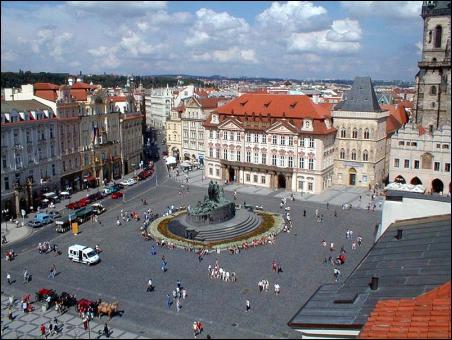
Photo courtesy of
the Prague Information Service.
That said, most NATO member heads of state disagree with the Bush Administration on almost everything, they compete economically, eye the Texan with disdain, and cringe at the thought of PAX Americana in their own backyard.
However, globalisation is the new European status quo. Now free within its third-way structure and apparent pragmatism, European nations are able to advance even within old European conservatism. Third way flourishes in the fertile earth of Brussels centrist politics and does equally well in economies experiencing economic reform wobbles. Former Soviet Bloc states are seizing globalisation as their ticket to ride, it is all-embraced as ‘just’ with regard to inter-nation stability.
This is the presenting face of Globalisation in the third-way era. But considering today’s theatre, the motives of the United States and the Russian Federation, there is much more at stake the micro-state economic progress.
The result at Prague will be the same as for Florence, Genoa, Seattle: bloody prison cells, rancid gas in the streets, and politicians raving how protesters are merely disrupting little bastards who deserve everything they get.
But then, protest and commanding written analysis provides conscience for today’s decision makers. No one knows that better than the Czech President Havel. If such protest is ignored, today’s decision-makers and their influence will be finite and eventually will certainly provide opportunity for others to say ‘let’s pause’, take a breath, and consider where each of us personally stand.
Protest is in times like these essential. It provides millions an issue to ponder, to draw their own line in the sand. And perhaps, humanitarianism, as a comparative value of balance, will therefore become both an ideal and a goal to consider.
For further reference, see…Imperial PAX Americana , http://www.scoop.co.nz/mason/stories/HL0210/S00099.htm , , http://www.natosummit.cz/en/, http://praha.indymedia.org/ , http://de.indymedia.org/2002/09/30525.shtml [in German] , http://www.nato.int/docu/comm/2002/0211-prague/index.htm , http://www.mvcr.cz/english.html , http://www.whitehouse.gov/news/releases/2002/10/20021021-8.html, http://www.scoop.co.nz/stories/PO0211/S00086.htm


 Richard S. Ehrlich: Deadly Border Feud Between Thailand & Cambodia
Richard S. Ehrlich: Deadly Border Feud Between Thailand & Cambodia Gordon Campbell: On Free Speech And Anti-Semitism
Gordon Campbell: On Free Speech And Anti-Semitism Ian Powell: The Disgrace Of The Hospice Care Funding Scandal
Ian Powell: The Disgrace Of The Hospice Care Funding Scandal Binoy Kampmark: Catching Israel Out - Gaza And The Madleen “Selfie” Protest
Binoy Kampmark: Catching Israel Out - Gaza And The Madleen “Selfie” Protest Ramzy Baroud: Gaza's 'Humanitarian' Façade - A Deceptive Ploy Unravels
Ramzy Baroud: Gaza's 'Humanitarian' Façade - A Deceptive Ploy Unravels Keith Rankin: Remembering New Zealand's Missing Tragedy
Keith Rankin: Remembering New Zealand's Missing Tragedy